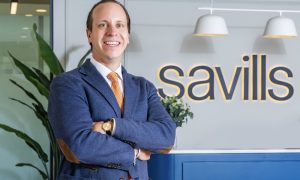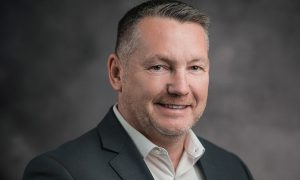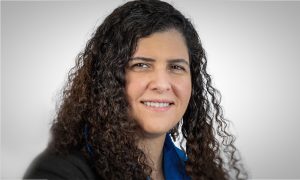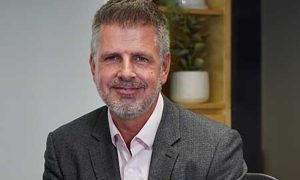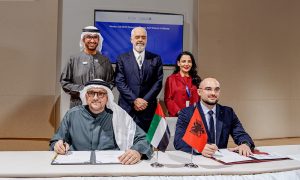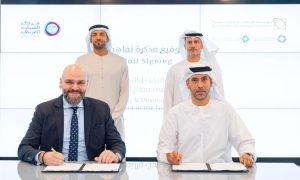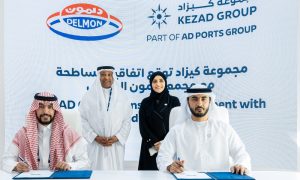Finding an extra edge: Interview with Saleh Abdullah Lootah
The CEO of Lootah Real Estate Development on keeping pace with a rapidly changing sector
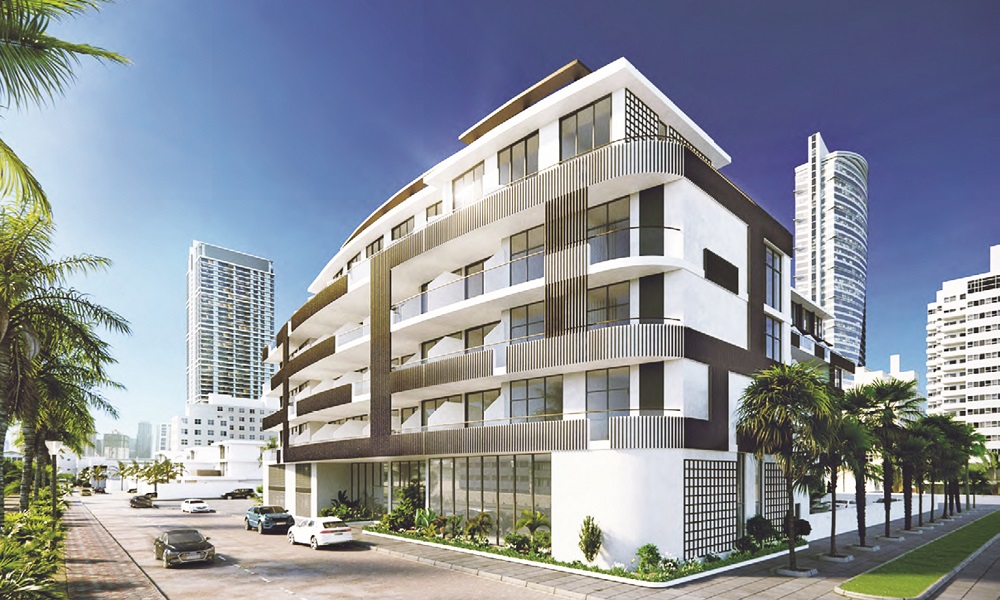
Earlier this year, Lootah Real Estate Development (Lootah) announced the launch of the region’s first lease-to-own industrial warehouse model in Dubai, with clients offered pre-built industrial warehouses at 2% down payment, with custom options available for different business. Clients will have full ownership of their warehouses within 10 years, the developer says.
This initiative is characteristic of Lootah’s approach to identifying and capitalising on what it perceives as gaps in the market. In the case of Senaeyat, the industrial warehouse development project, the company identified that clients were looking for custom-built, targeted warehouses with modern specifications and features, and was quick to move in response to the growing demand.
Being an early mover in the UAE real estate market has been one of the defining characteristics of Lootah’s long history in the country. Although the real estate developer only began operations in 2002, its holding company was in existence long before that, with operations and interests in fields as diversified as construction, energy, financial services, logistics and fast-moving consumer goods.
“With Lootah, we have been pioneers in different projects – Dubai Islamic Bank was founded by our founder – and if you talk about the SS Lootah Contracting Company, it is one of the first construction companies to be launched in Dubai. We have been pioneers with a lot of projects that we’ve launched in Dubai,” says Saleh Abdullah Lootah, CEO of Lootah Real Estate Development, in an exclusive interview with Big Project ME.
“Seeing the competition in the residential sector, we decided not to stop working in the sector, but to also divert our focus towards the industrial sector. This is where we came in with our latest product – Senaeyat. It is mainly focused on the industry sector, for the economy, which is something that everybody is looking for. It is considered to be the first project of its type in the industry.
“Going into the industrial sector, we have positioned this project based on our research, which is that 70% of warehouses that are being operated by main players in the market are on lease, i.e. they are not the owners. That means that in Al Quoz, JAFZA, DIP and all the other areas, 70% of the operators are leasing their warehouses. Most of them have been here in the market for the last 10 years, some for 20 years. They have been here for a long time, they have a reputation, a good name. They don’t want to leave Dubai, but they’re renting their warehouses. If the prices go up, if the owner of the warehouse decides to increase the price, then their business gets affected and they are at risk,” he says.
“So we came up with the solution of telling them, why do you want to rent warehouses when you can own them? It came at the right time, with the government offering a lot of incentives to business owners. That’s why we began lease-to-own, which was the first such model to be launched on the industrial side.
“We’ve seen lease-to-own in the residential sector, but this is the first project focusing on and targeting the industrial sector. Instead of them paying rent every year without getting any benefit from it, we are giving companies the opportunity where, after 10 years, they have a 90-year ownership,” Lootah asserts, adding that the project has been divided into three phases, with the first set to be finalised by the end of the year.
However, despite its pivot towards industrial real estate, Lootah continues to focus on its core business, the development of residential and commercial properties for the UAE market. To that end, Saleh Abdullah Lootah says last year was a good one for the developer, with several projects launched already sold in the market and a satisfied customer base. However, he acknowledges that the current market environment has posed some new challenges for the company, which in turn has pushed it to adapt and make strategic business decisions.
“In 2019, as you can see, the real estate market is going through difficulties in terms of offerings. This is why you see that HH Sheikh Mohammed bin Rashid Al Maktoum, the Vice President and Prime Minister of the UAE and the Ruler of Dubai, has gotten involved lately. He has stepped forward and talked about the challenges the real estate sector is going through, which in reality a lot of big developers are facing.
“HH is now involved in making sure that there is a balance between supply and demand, which is good for the industry. Now, I think, especially with the semi-government and private sector in the market, you see a lot of the main players are the semi-government firms. I think, in a way, we have realised that competing with each other is not helping anybody in the market. The supply is way more than the demand, and prices are coming down. Balancing it is good for everybody.”
“What we have done in Lootah Real Estate is that from day one, whatever we have launched – from The Edge, to The Waves, to Shamal Terraces and Residences – we have wanted to introduce something different. We did not want to compete head-to-head with whatever is in the market. We have always tried to have an extra edge compared to others, whether in terms of quality, finishes or offering. We always try to create the ‘wow’ effect for our customers,” Lootah says, adding that developers need to find value-adds or USPs that allow them to position themselves differently to their competitors, which is part of the reason he pushed for the firm to explore different avenues of growth.
Furthermore, he adds that given the current market conditions, developers need to start understanding their markets better and listen to their customers, so that they can gear their offerings to where the greatest demand is.
“I’m talking about really listening to your customers for exactly what they want, because sometimes one size does not fit all. Because there are a lot of offerings, our customers have become very selective in what they choose. Unless you go the extra mile, and unless you create the ‘wow’ factor, you won’t be able to sell [your product].
“When we introduced the loft concept, it was a little ahead of everybody and not everybody liked living in a loft. But when we started marketing it to the right customer profile, we found that the demand was very high. [So the lesson is that] you cannot sell what you would be selling to an Asian customer, to a local customer. Selling to a local and to an expat Arab would different, while Europeans and Asians would have different [tastes and demands]. Each one of them has their own uniqueness in terms of selling to them,” he asserts.
In the wake of the announcement of a higher committee to regulate Dubai’s real estate market, Lootah believes the move will allow private companies to contribute more towards the building of the economy, as they will have room for bigger margins and to do better business.
“Dubai has been built by the private sector. The government was not totally involved in business, and it only just started lately to be a part of the real estate development and the trading sector, through a lot of initiatives. It was something a little bit sensitive; a lot of the private sector do not like governments coming in and participating, because it’s a bit of a threat to them.
“HH Sheikh Mohammed bin Rashid Al Maktoum has been asked, why did Dubai’s government get into the real estate sector? Why are government or semi-government companies competing with the private sector? He answered a very good answer – he said it’s because he did not see the private sector have the guts to go and take bigger risks than what they were taking. The private sector is always concerned about their capital, and this is where their vision is.
“Nobody from the private sector will come and build the Burj Khalifa. Nobody from the private sector will build the Dubai Airport. The private sector will always have their concerns and calculations. HH said that because he did not see them having the guts to go with these big dreams, he contributed and pushed semi-government companies to participate.
“But now, I think he has realised that things have become this big, you don’t want to have repetitive projects, for example only residential, without really adding value to Dubai. He is now saying that he doesn’t want the same growth, he wants unique and ‘wow’ projects which will add value to Dubai. This is the right move, in my opinion,” Lootah says.
More work still needs to be done, he points out. While the move to regulate the market is a welcome and necessary step, Lootah stresses that an issue that needs urgent addressing is the way payment plans are structured in the market.
“The government is trying their best to stabilise the market, but we see a lot of projects that are not able to be finished. Why is that? Because of payment plans. A lot of projects have struggled to finish because of this kind of over-promising. I think RERA and the Land Department have learned from these mistakes.
“You see a lot of these attractive payment plans and aggressive sales tactics coming from semi-government developers, which is a lose-lose scenario. Nobody wins. The government is losing, Dubai is losing, with these kinds of aggressive sales tactics. I think reducing the supply [will help] build back the economy. Dubai is going back to its roots with the government playing a main role by being an enabler for the private sector, and businesses will be able to do their business without competing head-to-head [with the semi-government developers]. Once the cost of living and cost of doing business in Dubai is reduced, you will see more people being able to come and live and do business here,” he highlights.
Given how the real estate sector is changing so rapidly, Lootah says that for his company, there is only one option – to evolve with the times. While Senaeyat is one step into the future, he tells Big Project ME that Lootah Real Estate Development can do more to adapt to the new world it finds itself in.
One such initiative is Souq Extra, which was established in 2008 and integrates contemporary retail planning with lifestyle developments, engaging with local communities to deliver locally tailored real estate services. In addition, Lootah says the company is looking to expand further afield, with Saudi Arabia and Egypt earmarked as two major markets where it can add value, but adds that it is waiting for the right time.
“The market is forcing you to change, with what is coming into the market. If you talk about smart cities, for example, or about artificial intelligence, or if you talk about how technology can help, then we have been very active in that regard. We have just launched our CRM platform and finalised our ERP systems. We have been putting a lot of investment, both time- and money-wise, into raising the capabilities of our IT infrastructure so that we can make sure that our customers can reach us faster and in a more convenient manner.
“We try to listen as much as we can to our customer needs. Sometimes it’s not only about listening but also anticipating what the customer wants, which is even more difficult – giving the customer what he wants is not enough anymore. Now you have to give him things he doesn’t say that he wants, but he does want it.
“To that end, we do a lot of sessions with our customers, we do a lot of brainstorming internally and with brokers, we try to do a lot of qualitative interviews with end users to make sure that we can really address their requirements,” he says, adding that this approach is crucial to making the modern-day customer feel the difference between what Lootah Real Estate Developments offers, compared to other developers.
“If you are giving a customer something that he did not say he wants, but he sees you’re already giving it to him without saying anything – that is something that will create a difference. Our marketing team is working on so many initiatives, they are coming up with many campaigns to make sure that our customers, at the end of the day, are smiling.
“For us as Lootah, we have grown with Dubai and we have been here for the last 100 years, and we will be here for many years to come. We have been able to compete because of the trust that a lot of customers have in us. They know the name; they know the family and they know that this company is here to stay. What we have to be careful about is really making sure that our reputation is not being harmed because of what is happening in the market. It doesn’t mean that we can fulfill all the demands, but at the end of the day, we try to satisfy our customers with value for their money,” he concludes.
